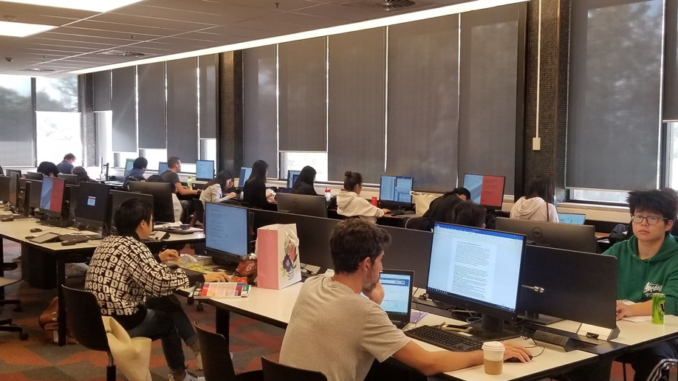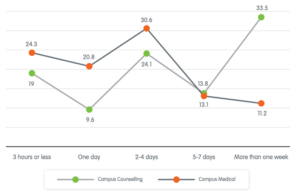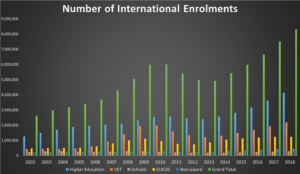
Earlier this year, Victorian Coroner Audrey Jamieson released a report indicated that 27 international students committed suicide between 2009 and 2015, which was shocking to many people.
Studying in top universities with nice campuses surrounded by beautiful scenery, the lives of the international students in Australia may seem glamorous to a lot of people. However, suicides have occurred repeatedly among some of them, such situation definitely worth pondering. Why would international students choose to end their lives in this way? Do Australian universities and community offer sufficient support to them?
In March 2016, The Age reported a Chinese international student Zhikai Liu committed suicide, due to insomnia and language barrier, just three months after his arrival for his university study in Melbourne. In the same year, SBS Australia reported Deepark Singh, an Indian international student also ended his life because he was ineligible for gaining Permanent Resident Visa in Australia.
These incidents raised public awareness about the pressures experienced by international students and the support they can access in Australia.
Difficulties Faced by International Students in Australia
According to the Australian Government statistics in 2018, nearly 900,000 international students enrolled in Australia, and the number is increasing year by year. This has revealed the importance of the education sector towards the Australian export industry.
These large population of international students often experience mental health issues due to various reasons. Homesickness might be one of the major sources of stress.
Vivian Ip, a Chinese postgraduate student studying at the University of Sydney, she moved to Australia a year ago. she said, “I felt especially depressed during the first three months of my stay in Australia. I had nobody to talk to, as all of my friends and family are miles apart.”
During the darkest time of Vivian, she even had suicidal thoughts. “My mental health condition adversely affected my academic results and daily activities, thus made my problem even worse,” She continued.
Research by Forbes-Mewett and Swayer has proven that international students have a higher anxiety level than domestic students and ABC News identified the challenges international students face are sometimes more in comparison, for instance, cultural shock, language barriers and loneliness. It is also difficult for individuals to be away from families and friends support and step out of their comfort zones.
Another student from South Korea studying at the University of Melbourne, Vito Chow said, “My parents are extra frugal to save money and send me here, I am worried that I can’t graduate and I can’t get satisfactory grades on my study too.” Considering the large investment that parents have made on them, international students are likely to place considerable pressure and stress on themselves to succeed.
Support Offered to International Students in Australia

There are currently plenty of mental health services available for international students. For instance, Beyond Blue, Lifeline and Counselling and Psychological Services available in universities. Overseas Students Health Cover (OSHC) also covers visits to General Practitioners (GP). However, some international students still complain about receiving insufficient support from the Australian community.
“I tried to reach out to mental health support services in my university. However, it took me nearly two weeks to get a face-to-face counselling appointment,” Vivian complained.
Mental health support in Australian universities fails to keep up with the increasing demand from students. Students in need sometimes have to wait for weeks to receive help, which is very dangerous.
“Even for online counselling services, I had to wait for two hours for a 15 minutes-chat with a counsellor, which is completely useless,” Vivian added.
The graph from headspace below shows, over 30% of people who had accessed to counselling services on campus waited for more than a week, which is relatively long when comparing to the campus medical services.

The Guardian reported that Coalition has promised an additional $42 million on mental health services for Australian citizens recently. However, it was noticed in Victorian Coroner ‘s report that there were Insufficient mental health services tailored for international students.
Mark Shadwell, the Administrative Officer of the University of Sydney Counselling and Psychological Services (CAPS) said, “CAPS currently only provide Counselling services in English, international students with specific needs have to be referred to external services outside the university.”
International students can request for a translator if required but may result in additional waiting time.
“It is hard for me to fully express my inner thoughts in English, so it’s difficult to show my feeling to anyone here in Australia,” said Vito.
Providing Appropriate Help to International Students
One of the major problems is to get international students to seek help. Victorian Coroner Audrey Jamieson’s report found that international students are 35% less likely to seek help than their domestic counterparts when experiencing mental health problems.
Both Vivian and Vito said that they received limited information on how to access mental health services in universities and they didn’t know what exactly their OSHC cover paid for.
“I have spent lots of time searching for mental health support information online, but I don’t think this is what a serious mental health patient can do,” said Vivian.
While discussing mental health is increasingly common in Australia, this may not be the same in some other countries. International students may think that admitting they have mental health problems is embarrassing.
“Talking about mental health problem seems a taboo in South Korea, so I rarely talk about this issue, especially I am a boy who is supposed to be tough,” Vito stated.
Audrey Jamieson also suggested in her report that the Australian government should formulate policies encouraging international students to seek assistance.

As there is a gradually increasing number of international students in Australia, Jamison’s report has suggested that more should be done to ensure international students’ mental health needs are not being disregarded. More customized services and service providers should be furnished during the international students’ period of stay in Australia. There is also a need for increasing international students’ awareness on available services and remove the stigma of mental health exist among students with different cultural backgrounds.
For mental health issues, contact the following for support services:
Beyond Blue: 1300 22 4636
24/7 Lifeline crisis line: 13 11 14
In Emergency: 000





Be the first to comment